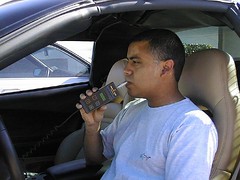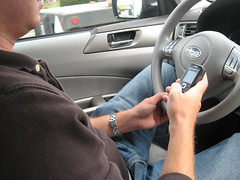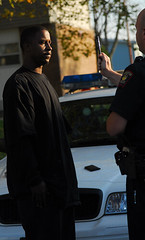 A man was arrested in Alaska for operating under the influence Aug. 3, 2012 as he floated down a river on an inflatable raft. In Alaska, as in Massachusetts, the legal limit is 0.08. A wildlife trooper arrested William Modene, 32, after authorities received reports of a “heavily intoxicated” man floating along the Chena River. Modene’s alleged BAC was 0.313. “Modene had been floating on the river for the day and consuming alcoholic beverages the entire time,” according to the troopers’ website.
A man was arrested in Alaska for operating under the influence Aug. 3, 2012 as he floated down a river on an inflatable raft. In Alaska, as in Massachusetts, the legal limit is 0.08. A wildlife trooper arrested William Modene, 32, after authorities received reports of a “heavily intoxicated” man floating along the Chena River. Modene’s alleged BAC was 0.313. “Modene had been floating on the river for the day and consuming alcoholic beverages the entire time,” according to the troopers’ website.
Alaska’s drunk-driving laws apply not only to vehicles but also to “water craft,” which is defined as “a vessel used or capable of being used as a means of transportation on water for recreational or commercial purposes…” In interpreting a law, such as the Alaska OUI law at issue here, courts do not consider the wording of the statute alone, but also try to determine the intent of the legislature in enacting the law. Courts generally consider the words used in connection with the causes of the law’s enactment and the goal to be accomplished.
Here, it would seem that by including the “water craft” language, the Alaska legislature likely intended to cover boats, jet skis, and other such motorized watercraft. Operating boats and jet skis while drunk has become a rising concern, and boating accidents have been the cause of thousands of injuries and deaths in recent years, according to Global Legal Resources. Typically, the primary goal of OUI laws like this Alaska law is to protect the lives and safety of the public. While it appears that a float would be included under the wording of this law, the legislature likely did not intend to criminalize drinking while on a float or inner tube, as such activities generally do not endanger the lives or safety of the public.
The reader “Comments” section on the Fairbanks Daily News website indicates that a majority of readers thinks that arresting this man for OUI was unreasonable. One reader wrote, “How can a guy in a non-motorized plastic blow up boat do any harm to anyone but himself?” Another reader wrote, “I don’t need someone to run my life and tell me what is safe or not safe as long as I’m not endangering others…Can I drink beer and go swimming in the ocean?” Yet another reader wrote, “I disagree with all of this. If he causes no harm to others, leave him be. If he dies, see you soon.” One reader who supported the arrest wrote of Modene’s “self endangerment” and the duty of the police protect “people who…are incapacitated to the point of self endangerment. ” This sampling of reader comments illustrates the topic of our last blog post, which involved the idea of potential harm to others v. potential harm to oneself.
To read the article upon which this post was based and the accompanying reader comments, see:
Massachusetts Drunk Driving Defense Law Firm
Operating under the influence laws throughout the country, including Massachusetts OUI / DUI / drunk-driving laws, are increasingly being applied to cover a broader range of conduct. This arrest for operating an inflatable float while drunk is just one example.
 Massachusetts DUI Lawyer Blog
Massachusetts DUI Lawyer Blog


 A recent article in the Boston Globe got my attention as a
A recent article in the Boston Globe got my attention as a  A recent article about a drunk driver found in Brookline caught my eye as a
A recent article about a drunk driver found in Brookline caught my eye as a  If you listen to politicians and the media, you might think drunk drivers are the most serious menace on the roads today. However, a new report from the AAA Foundation for Traffic Safety reveals another under-recognized danger: drowsy drivers.
If you listen to politicians and the media, you might think drunk drivers are the most serious menace on the roads today. However, a new report from the AAA Foundation for Traffic Safety reveals another under-recognized danger: drowsy drivers.  A Beverly woman is in legal trouble after a teenager claimed the woman hosted a party at which she served teenagers a large amount of alcoholic drinks. That would put the woman in violation of the Massachusetts social host law, which dictates criminal penalties for adults who knowingly serve alcohol to minors. As a
A Beverly woman is in legal trouble after a teenager claimed the woman hosted a party at which she served teenagers a large amount of alcoholic drinks. That would put the woman in violation of the Massachusetts social host law, which dictates criminal penalties for adults who knowingly serve alcohol to minors. As a  A new Massachusetts law went into effect on September 30, forbidding texting while driving for all drivers, and both texting and cell phone use for drivers under 18. As a
A new Massachusetts law went into effect on September 30, forbidding texting while driving for all drivers, and both texting and cell phone use for drivers under 18. As a  Many of the cases of intoxicated driving that I’ve written about include good examples of what not to do and what not to say if you’re pulled over for drunk driving. For example, telling the officer you’ve been drinking and popping pills all day is not the best idea. As a
Many of the cases of intoxicated driving that I’ve written about include good examples of what not to do and what not to say if you’re pulled over for drunk driving. For example, telling the officer you’ve been drinking and popping pills all day is not the best idea. As a